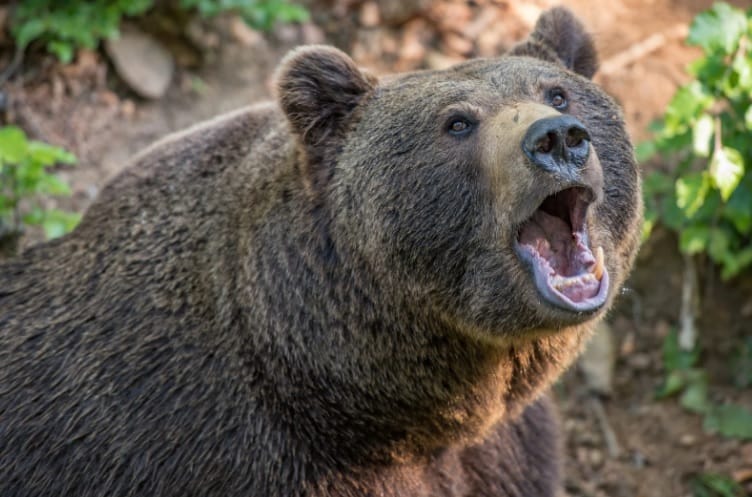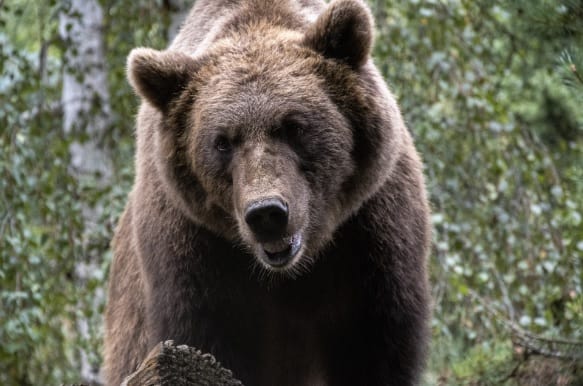
We have all watched camping movies that involve a bear sniffing around the campsite or hikers hearing a low growl and then seeing a flash of white fangs. Cue the spilled popcorn, shrieks, and quivers of fear. But, of course, it’s only a movie, and the suspense you feel is from the safety of your comfy sofa.
So what are your chances of surviving a bear attack? In short, you have an 86% chance of surviving a bear attack. According to the National Park Service, there is a 1 in 2.7 million chance that a bear will even attack you; these odds mean that a bee is more likely to kill you than a bear.
Of the approximate forty bear attacks annually, only 14% end fatally. However, this is not because you are the world’s strongest human-bear fighting machine but because of the statistics.
These look like some very favorable odds, but who wants to wrestle with a bear to find out if they are one of the 14%?
Is It Better To Out Run A Bear?
Running away might seem preferable to doing the tango with 500 pounds of hairy, growling, teeth-festooned muscle until you look at the stats. Considering that a polar bear can run 25mph/40kph, and a brown bear can run 35mph/56kph unless you are an Olympics sprinter and have broken the world record of 28mph/44.72kph, let’s be honest, you stand no chance of out running a bear!
Surviving The Growl Waltz
Surviving a bear attack and living long enough to tell the tale requires employing a few basic tactics.
Play Dead
Most pet owners teach their dogs to play dead; we bet you wouldn’t have considered this a scenario in surviving a bear attack. But yes, play dead!
It would be best if you lay flat on your stomach with your legs spread into a star shape. As vulnerable as this may seem, spreading your legs will make it more difficult for the bear to try and flip you like a pancake. More here on staying still during a bear attack.
Do:
Clasp your hands behind your neck and lie as still as humanly possible until the bear leaves. No easy feat with what feels like a gigantic, angry, and murderous hairdresser breathing down your neck! But that’s another blog entirely!
Don’t:
Provoke the bear or ‘try’ to scare it off; this will be a surefire way for you to ensure a bear does attack. Only if the bear does start attacking should you try and fight back, and fight as if your life depends on it as it probably does!
Bears Fight Dirty
It is advised that even if a bear bites you during an attack (such bad form), you should remain still and continue to play dead. Not easily done, but this one action, or rather non-action, could just save your life!
If you continue to stay still and silent, the bear will no longer see you as a threat and will continue on its way to feast on berries or the next unsuspecting hiker (only kidding). But joking aside, National Park Service says that 80% of the people who fought back were seriously injured. Remaining still and silent may seem impossible, especially when injured, but it certainly increases your chances of getting away with only minor injuries.

When To Fight And When To Admit Defeat
So how, then, do you decide when is the right time to play dead and when is the right time to fight back?
- Surprise Attack
Surprise bear attacks are usually a result of a bear reacting defensively. For example, a sow grizzly protecting her cubs. In this instance, she will not stop attacking until she is certain the threat (you) is obliterated. In this instance, play dead, as this will prevent a prolonged attack and serious injuries.
- Curious Or Predatory Attack
Slow-approaching bears that display aggressive behaviors such as ground-slapping, charging, or barking are usually protecting their territory or interested in your cheese sandwich. Either way, it’s time to move to a place of safety. Don’t run. Should the bear attack, this is the time to fight back using anything you can lay your hands on, including sticks, rocks, or bear spray.
Escape By Another Means
- Distraction
Another method would be to try and distract the bear by dropping something; while the bear is distracted, you could slip away. But, again remember, no running because the bear will likely hear the movement, see you running and start chasing you.
- Bear Spray
When hiking, it is advised to carry bear spray with you. If you are wondering what this is, UDAP is a pepper spray developed specifically for bear attacks. The bear spray is effective, shoots quite far, and temporarily reduces the bear’s ability to smell, breathe or see, providing you with enough time to escape.
Ineffective Bear Defense Methods
Method #1:
You probably think a gun would be a better option than a can of aerosol when faced with a huge hairy bear. After all, bullets are far more effective than a small can of bear spray, aren’t they? But unfortunately, shooting a bear when it is attacking at close range is near impossible.
Unless the shot hits the bear in the head or heart, killing it instantly, wounding it will only slow it down for a matter of seconds. This means you will have an injured, further angered bear resuming its attack on you at full throttle!
Method #2:
You are in a forest, and seeing a bear, your natural instinct might be to start climbing a tree. However, in the bear’s natural habitat, climbing trees is often a daily activity, meaning they are very good at shimming up a tree truck.
Competitive tree climbing with bears usually results in one winner, the bear! Therefore, it is ill-advised to try and climb a tree as this may further provoke an attack. Statistics show that 61% of the people that thought they could escape a bear attack by climbing a tree or running away were attacked.
Simple Methods To Limit Bear Attacks While Hiking
To further limit the chances of a bear attack (has anyone remembered those bees?!), is to hike in groups and not veer off the trails and hiking paths. Some hikers hang bells on their backpacks to deter bears, which has shown to be an effective deterrent.
In addition, singing and talking loudly in groups successfully prevents furry bear hugs, as loud noises aren’t very appealing to the bears.
The Final Grizzle
So what are your chances of surviving a bear attack? Unfortunately, if a bear attacks, the odds are not greatly in your favor despite the stats we shared at the start of this article. First, bears are bigger than you unless you are a sumo wrestler, and bears are faster than you; we know you aren’t an Olympic athlete.
However, while this may reduce your survival odds somewhat drastically, there are certain things you can do to help you live to tell the tale. First, assess the situation and try not to panic, scream or run. Next, respond as calmly and appropriately as possible – play dead or use the bear spray, man!

